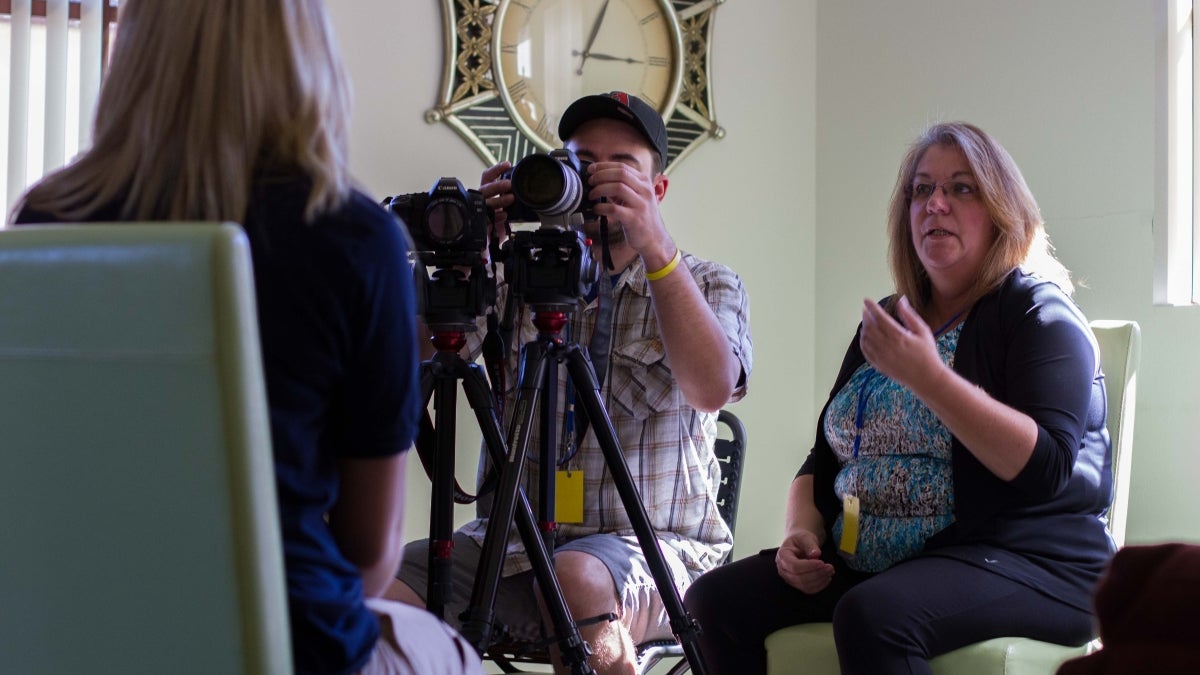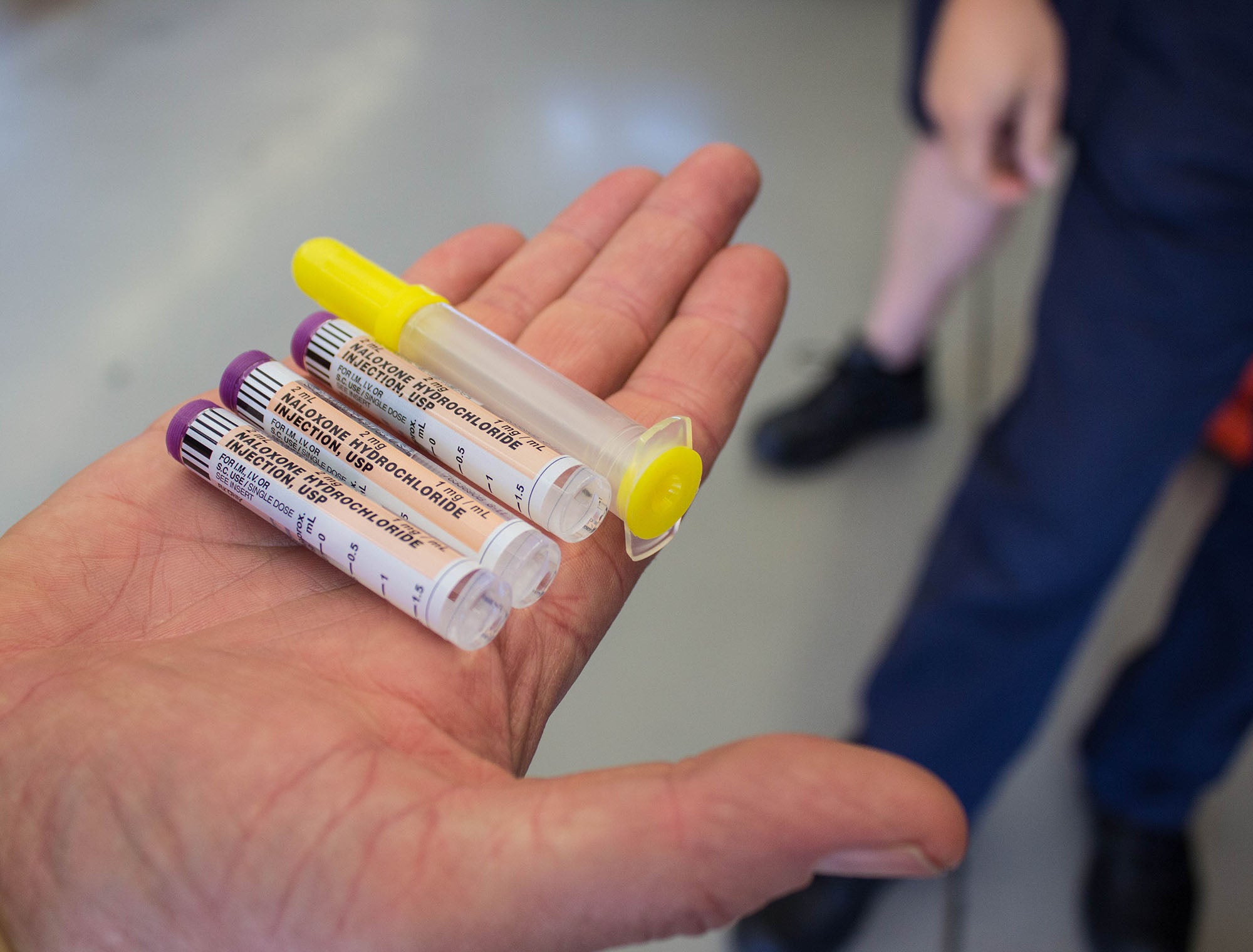Arizona State University’s Walter Cronkite School of Journalism and Mass Communication on Tuesday won an Alfred I. duPont-Columbia Award, which has recognized the very best in broadcast journalism for more than 70 years.
Cronkite News, the school's student-produced news division of Arizona PBS, received the honor for “Hooked: Tracking Heroin’s Hold on Arizona,” a 30-minute documentary produced in association with the Arizona Broadcasters Association (ABA), which reached more than 1 million Arizonans. The report, the final product of more than 70 dedicated student journalists, which aired on all 33 broadcast television stations and 93 radio stations in Arizona in January, examined the rise of heroin use and its impact on the state.
Other duPont Award winners this year included ABC News, “Frontline” on PBS, “60 Minutes” on CBS, as well as WBEZ and “This American Life” for the “Serial” podcast.
The win marks just the third time in the history of the duPont Awards that a Phoenix-based news operation has received the honor. Cronkite News joins 12 News KPNX-TV, which won the award last year, and KOOL-TV, which won the award in 1979 when it was the region’s CBS affiliate.
“This is a tremendous honor for our amazing students and faculty,” said Cronkite School Dean Christopher Callahan. “More than 70 students and eight faculty members worked on this project, traveling across Arizona to shine a light on this terrible epidemic. To be recognized with a duPont Award says a lot about how the work of our students is impacting the state.”
Work on the documentary started in August 2014 under the direction of Cronkite professor Jacquee Petchel, a Pulitzer Prize-winning investigative journalist. Teams of advanced student journalists interviewed numerous sources across Arizona, telling stories of addicts struggling with sobriety, families grappling for solace, and law enforcement officials battling on the frontlines.
The documentary included an interactive website with more than a dozen in-depth reports and an unprecedented data analysis of more than 10 million Arizona hospital emergency room cases, led by another Pulitzer Prize winner, Knight Chair Steve Doig. The Cronkite Public Insight Network Bureau, led by veteran public radio journalist Rebecca Blatt, located sources not previously tapped by journalists.
Students also produced a tablet app on the history of heroin under the guidance of Cronkite New Media Innovation and Entrepreneurship Lab Director Retha Hill. Additionally, public relations students produced strategic communication plans for the TV special under the direction of Cronkite PR Lab Director Fran Matera.
“They exceeded every expectation, no matter how uncomfortable, no matter how daunting, without so much as a flinch of doubt,” Petchel said. “It's not only a testament to the Cronkite School's innovative journalism program, but to Arizona State University's commitment that we be relevant to our community.”
On Jan. 13, the commercial-free documentary premiered on all Arizona television stations in English and Spanish, drawing nearly half of the Phoenix viewing audience of the 2014 Super Bowl. During and after the simulcast in Arizona, recovery counselors answered 438 calls through an ABA-sponsored call center at Arizona PBS for assistance on heroin and opioid addiction.
A hand holds tubes of naloxone hydrochloride, a chemical used to remedy opiod overdoses. Photo courtesy Cronkite News. Top photo by Dominick DiFurio.
The duPont Award is the latest honor for the “Hooked” documentary, which has made history in several journalism contests winning awards typically reserved for professional news operations.
In October, the documentary received two of the region’s top professional honors at the Rocky Mountain Emmy Awards, an Emmy in the category of “Societal Concerns – Program/Special,” as well as the Governors’ Award. In May, students who worked on “Hooked” took first place in video storytelling at the Arizona Press Club Awards.
“I think it’s a testament to what we do here,” Petchel said. “Students can do what others cannot do, and you can do it because you’re at the Cronkite School.”
Since the documentary’s airing, ASU students have continued to produce broadcast and digital reports on the heroin epidemic through Cronkite News.
“Producing ‘Hooked’ was the first time I experienced the influence of strong, community journalism,” said Cronkite graduate Erin Patrick O’Connor, who served as the documentary’s director and is now a news video editor for The Washington Post. “This project served as a voice for local Arizonans that were feeling the pressures of heroin addiction. I am truly thankful to have had the opportunity to work with ASU and Jacquee Petchel and bring this story to life.”
Joining O’Connor in the award are Petchel and Assistant Dean Mark Lodato, who served as executive producers; producer/assistant editor Elizabeth Blackburn; reporters Sandy Balazic, Lauren Loftus and Hunter Marrow; reporters/photographers Sean Logan, Jessica Boehm, Dominick DiFurio, Emilie Eaton, Danielle Grobmeier, Lauren Handley, Vivian Padilla, Hannah Lawrence and Liliana Salgado; and Cronkite lecturer Jim Jacoby, production manager.
They will receive the award during a ceremony hosted by Tom Brokaw, special correspondent for NBC News, and ABC News “Nightline” anchor Juju Chang on Jan. 19 at Columbia University’s Low Memorial Library. It will be livestreamed at bit.ly/cjslive.
The Alfred I. duPont-Columbia University Awards honor excellence in broadcast, digital and documentary journalism. The awards, established in 1942 by Jessie Ball duPont in memory of her husband Alfred I. duPont, are generously supported by the Jessie Ball duPont Fund.
"Hooked" can be seen online at hookedaz.cronkitenewsonline.com.
More Law, journalism and politics

ASU's Sports Law and Business program is in a league of its own
Breaking into the baseball business, or any other sport, is like hitting a grand slam — difficult but highly satisfying.It requires solid connections, says Aaron Hernandez, assistant dean…

Recently launched NEWSWELL supports local news outlets to empower communities, transform local news industry
Based out of Arizona State University, a recently launched nonprofit organization is transforming the desert landscape — but perhaps not the desert you’re picturing.NEWSWELL, which publicly launched…

Opportunities and risks of AI in the court system
“Science and innovation have always been an important part of ASU Law.” That's what Stacy Leeds, dean of Arizona State University’s Sandra Day O’Connor College of Law, told a room full of…

